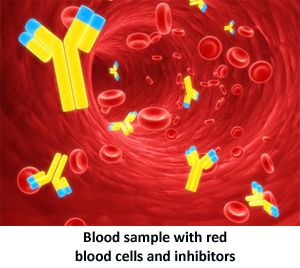Inhibitors

When some people take factor concentrate or more rarely, fresh frozen plasma that contains factor, their immune system makes certain proteins called inhibitors. Inhibitors are antibodies against factor. The body forms antibodies to defend itself from “foreign” substances. This is highly beneficial when antibodies form against viruses or bacteria. However, when inhibitor antibodies form against infused factor they interfere with the factor’s function and prevent the body from using the factor to clot and stop bleeding.
If a person with an inhibitor has a bleed, their regular dose or type of factor may not stop the bleed and special treatments may be needed. Up to 33% of people with Hemophilia A (factor VIII) and up to 6% of people with Hemophilia B (factor IX) may develop an inhibitor. Most people who develop inhibitors have a diagnosis of severe Hemophilia (with <1% factor).
People likely to have inhibitors
There is currently no clear cause why some people with Hemophilia form inhibitors. If you have a relative with an inhibitor, you are also more likely to develop one, suggesting that there may be genetic (inherited) factors which increase likelihood of developing inhibitors. Black or African American people with Hemophilia are more likely to develop inhibitors than White people with Hemophilia, possibly due to differences in factor VIII protein structure. The most common time of inhibitor development is in the first few exposures to factor therapy. Many physicians will quote the first 20-50 exposures as the highest risk period for inhibitor development.
Using less factor does not lower your chances of developing an inhibitor. Some people with Hemophilia develop an inhibitor after very few infusions. Other people never develop an inhibitor, even though they use a lot of factor. So, you should not try to minimize factor use to try to prevent inhibitor formation. This will not reduce your chances of developing an inhibitor, and it will increase risk of damage to your body from bleeding events.
Special needs of a person with an inhibitor
A person with an inhibitor or parents of a child with an inhibitor may need extra emotional support. Treating bleeds in someone with an inhibitor can be challenging because it may take a variety of methods and a lot of time. If you have an inhibitor or are the parent of a child with an inhibitor, keep in close contact with your HTC. The staff there can offer you both medical advice and emotional support for dealing with this Hemophilia complication. Your medical alert tag and identification card should note that you have an inhibitor.
